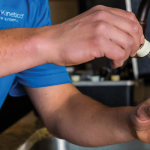
In the intricate ecosystem of healthcare, where timely delivery of medical supplies can often make the difference between life and death, medical courier plays a crucial role. These unsung heroes navigate a complex web of responsibilities to ensure the seamless transportation of sensitive and critical items within the medical industry. From blood samples to pharmaceuticals, their duties encompass much more than simply delivering packages from point A to point B.
1. Precision in Handling Medical Specimens:
One of the primary responsibilities of a medical courieris handling medical specimens with utmost care and precision. This includes blood samples, tissue samples, urine specimens, and other biological materials. Couriers must adhere to strict protocols to maintain the integrity of these samples, ensuring they reach their destination uncontaminated and undamaged.
2. Adherence to Regulatory Standards:
Medical couriers operate within a highly regulated environment governed by strict standards and guidelines. They must possess a comprehensive understanding of regulations such as HIPAA (Health Insurance Portability and Accountability Act) and OSHA (Occupational Safety and Health Administration) to ensure compliance throughout the transportation process. This involves maintaining confidentiality, proper handling procedures, and ensuring the safety of both the courier and the items being transported.
3. Timely and Efficient Delivery:
In healthcare, time is often of the essence. Medical couriers are responsible for ensuring the timely and efficient delivery of medical supplies to hospitals, clinics, laboratories, and other healthcare facilities. They must prioritize urgent deliveries, such as transplant organs or time-sensitive medications, while also managing multiple deliveries within tight schedules.
4. Temperature-Controlled Transport:
Many medical specimens and pharmaceuticals require specific temperature conditions to remain viable during transport. Couriers are tasked with maintaining proper temperature control throughout the journey, whether it involves refrigeration, freezing, or ambient temperature settings. This is crucial for preserving the efficacy of medications and the accuracy of diagnostic test results.
5. Documentation and Chain of Custody:
Maintaining accurate documentation and a clear chain of custody is essential in the medical courier’s role. They must carefully document each step of the transportation process, including pickup, transit, and delivery, to ensure accountability and traceability. This documentation is particularly important for legal and regulatory purposes, as well as for addressing any potential issues or discrepancies that may arise during transit.

6. Communication and Customer Service:
Effective communication is key to the success of any courier service, especially in the healthcare sector. Medical couriers must maintain open lines of communication with dispatchers, healthcare providers, and other stakeholders to coordinate deliveries, provide status updates, and address any concerns or special requirements. Additionally, they must deliver exceptional customer service, demonstrating professionalism, empathy, and reliability in every interaction.
7. Emergency Response and Problem-Solving:
In emergencies or unforeseen circumstances, medical couriers must remain calm under pressure and adapt quickly to resolve issues. Whether it’s navigating through traffic delays, inclement weather, or mechanical breakdowns, they must employ problem-solving skills to ensure deliveries are completed safely and on time. This may involve rerouting deliveries, coordinating with alternative transportation methods, or liaising with healthcare facilities to mitigate any disruptions.










